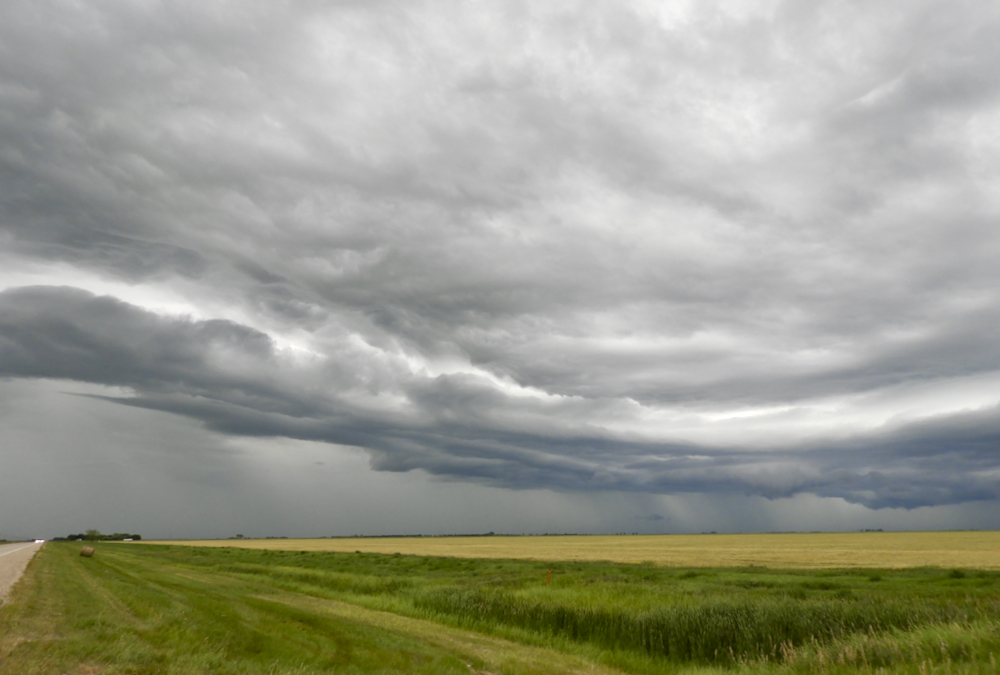Producers’ climate change strategy: mitigate or adapt?

Glacier FarmMedia – Canadian farmers could benefit from climate change, says an Ontario agricultural economist.
Read Also
Ontario’s 2024 Outstanding Young Farmer will be named August 22
Ontario’s Outstanding Young Farmer will be chosen August 22 at Thatcher Farms in Rockwood. OOYF alumni, Adam and Dana Thatcher,…
That’s not a popular perspective, since mitigating climate change and reducing emissions from food production have become the main priorities in Canadian agriculture.
Why it matters: An economist believes farmers could benefit from changes related to climate change.
However, Al Mussell is saying it out loud.
“Being at the northern fringe of viable agriculture globally, a subtly warmer and wetter situation is surely a benefit for Canada,” says Mussell of Agri-Food Economic Systems, a research group in Rockwood, Ont.
“But there are many layers to climate change in agriculture.”
In a paper released June 20, Mussell argues that Canadian agriculture policies should be focused on adapting to a changing climate. Mitigation is the long game, but the short-term priority should be adaptation.
“For Canada, surely climate change mitigation is less important than adaptation … given the magnitude of observed and expected changes and because food is a fundamental, imminent need that is highly sensitive to climatic conditions and that is scarce in the world,” he wrote in the paper.
“Canada is a significant net agri-food exporter with capacity to help offset reductions in food production elsewhere in the world due to the detrimental effects of climate change.”
The notion that Canadian farmers could benefit from climate change and should opt for adaptation contradicts the federal government’s stance on the issue. In 2021, Canada’s agriculture ministers made an announcement called the Guelph Statement that emphasized a new approach to agriculture.
It is about mitigation and “tackling climate change and environmental protection to support (greenhouse gas) emission reductions and the long-term vitality of the sector.”
Put another way, the feds believe Canadian farmers and the ag industry should be reducing emissions. In turn, that will save the atmosphere and make food production more viable over the long haul.
The approach could be the right solution, but the world still needs to eat for the next 50 to 100 years, Mussell said.
“Ultimately, successful mitigation will be a substitute for adaptation … but will take decades. We need to achieve and sustain food security in the world to buy this time.”
Potential benefits
Mussell is not a climatologist, but as an economist he does understand numbers. To gather information for the paper, he reviewed scientific research and data illustrating the long-term changes in Canada’s climate.
He concluded that Canada is getting warmer and wetter, mostly in the winter and in the North.
“Nonetheless, it is resulting in a longer growing season with adequate precipitation, allowing increased yields, movement of new crops into previously unsuitable areas and movement of agriculture into areas that have previously been unsuitable to be farmed,” he wrote.
If the growing season is getting longer and warmer, it should allow farmers to grow different crops or adapt to the changing climate.
“We also see dramatically more heat units,” he said.
A future with different crops and adaption to climate change may be possible, but putting a positive spin on climate change doesn’t fit with the current mantra in Canadian agriculture, where farmers must reduce emissions or face dire consequences.
Dairy Farmers of Canada, for example, has promised that all dairy farms will produce net zero emissions by 2050. Other agriculture groups have made similar promises to cut emissions in the short term.
Mussell agrees that mitigation cannot be ignored. It is necessary. However, Canada’s situation is different from countries that are close to the equator.
Agriculture in countries with warmer climates could suffer, but “changes in the Canadian climate stand to be beneficial for its agriculture,” he wrote.
“I think mitigation is important, and we need to look at where we can contribute, but if you’re looking at focus … it’s got to be on adaptation.”
Source: Farmtario.com

